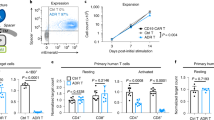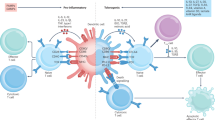Abstract
AUTOIMMUNE reactions have hitherto been considered to be harmful or at best neutral for the individual. Specific autoimmune reactions in certain experimental systems may, however, have consequences of potential positive value for the, individual1. Here, advantage was taken of the fact that antigen-binding receptors of B and T lymphocytes belong to the classes of self-molecules against which autoimmunity can be inflicted1–4. Such receptors can be classified according to specific antigen-binding capacity or unique antigenic, idiotypic markers5. In one system studied, autoanti-idiotypic antibodies were induced against rat T and B cell receptors specific for major histocompatibility antigens of the species1. Soluble antigen-binding receptors were purified using anti-idiotype immunosorbants. Autoimmunisation with purified, polymerised receptors lead to production of autoanti-idiotype immunity. This caused a selective elimination of lymphocytes carrying the relevant idiotypic, antigen-binding receptors. Consequently, such autoimmune rats could be shown to be tolerant to transplantation of skin from the proper foreign donor, whereas reactivity against third party skin was left intact. No negative side-effects were noted during immunisation. Thus, autoimmunisation against the individual's receptors for a given antigen may constitute an efficient way of producing specific immune tolerance in adult, immunocompetent individuals. This approach would have obvious possible applications in clinical transplantation immunology, in treatment of allergic disorders, and might even be used when trying to regulate the course of certain autoimmune diseases. The requirement to have accessible anti-idiotypic antibodies to make the necessary immunosorbants to obtain pure receptors, is, however, a severe drawback. An approach allowing autoanti-receptor immunisation without having to rely on sophisticated or unobtainable reagents would be of great usefulness. Here, we report on a technique whereby autoanti-receptor immunity leading to specific immune unresponsiveness can be induced in vivo using as immunogen the individual's own antigen-specific lymphoblasts as obtained after in vitro immunisation.
This is a preview of subscription content, access via your institution
Access options
Subscribe to this journal
Receive 51 print issues and online access
$199.00 per year
only $3.90 per issue
Buy this article
- Purchase on Springer Link
- Instant access to full article PDF
Prices may be subject to local taxes which are calculated during checkout
Similar content being viewed by others
References
Binz, H., and Wigzell, H., Nature, 262, 294–295 (1976).
Rodkey, L. S., J. exp. Med., 139, 713–720 (1974).
McKearn, T. J., Stuart, F. P., and Fitch, F. W., J. Immun., 113, 1876–1882 (1974).
Sakato, N., Janeway, Jr, C. A., and Eisen, H. N., Cold Spring Harbor Symp. quant. Biol., (in the press).
Oudin, J., Ann. Immunol. (Inst. Pasteur), 125 C, 309–337 (1974).
Wigzell, H., Progr. Immun., 1, 1105–1114 (1971).
Miller, R. G., and Phillips, R. A., J. Cell. Physiol., 73, 191–201 (1969).
Andersson, L. C., and Häyry, P., Transplant. Rev., 25, 121–162 (1975).
Binz, H., Wigzell, H., and Häyry, P., Nature, 259, 401–403 (1976).
Perlmann, P., and Perlmann, H., Cell. Immun., 1, 300–314 (1970).
Dorval, G., Welsh, K., and Wigzell, H., Scand. J. Immun., 3, 405–411 (1974).
Binz, H., Wigzell, H., J. exp. Med., 142, 197–210 (1975).
Author information
Authors and Affiliations
Rights and permissions
About this article
Cite this article
ANDERSSON, L., BINZ, H. & WIGZELL, H. Specific unresponsiveness to transplantation antigens induced by auto-immunisation with syngeneic, antigen-specific T lymphoblasts. Nature 264, 778–780 (1976). https://doi.org/10.1038/264778a0
Received:
Accepted:
Issue Date:
DOI: https://doi.org/10.1038/264778a0
This article is cited by
-
Anti-idiotypic T cells suppress rejection of renal allografts in rats
Nature (1985)
-
Anti-Idiotypic autoimmunity - a necessity for species survival
Survey of Immunologic Research (1984)
-
T cell regulation, anti-idiotypic immunity, and the nephritogenic immune response
Kidney International (1983)
-
Induction of anti-idiotypic antibodies by immunisation with syngeneic spleen cells educated with acetylcholine receptor
Nature (1978)
-
Recognition of antigens by T lymphocytes
Molecular and Cellular Biochemistry (1978)
Comments
By submitting a comment you agree to abide by our Terms and Community Guidelines. If you find something abusive or that does not comply with our terms or guidelines please flag it as inappropriate.



